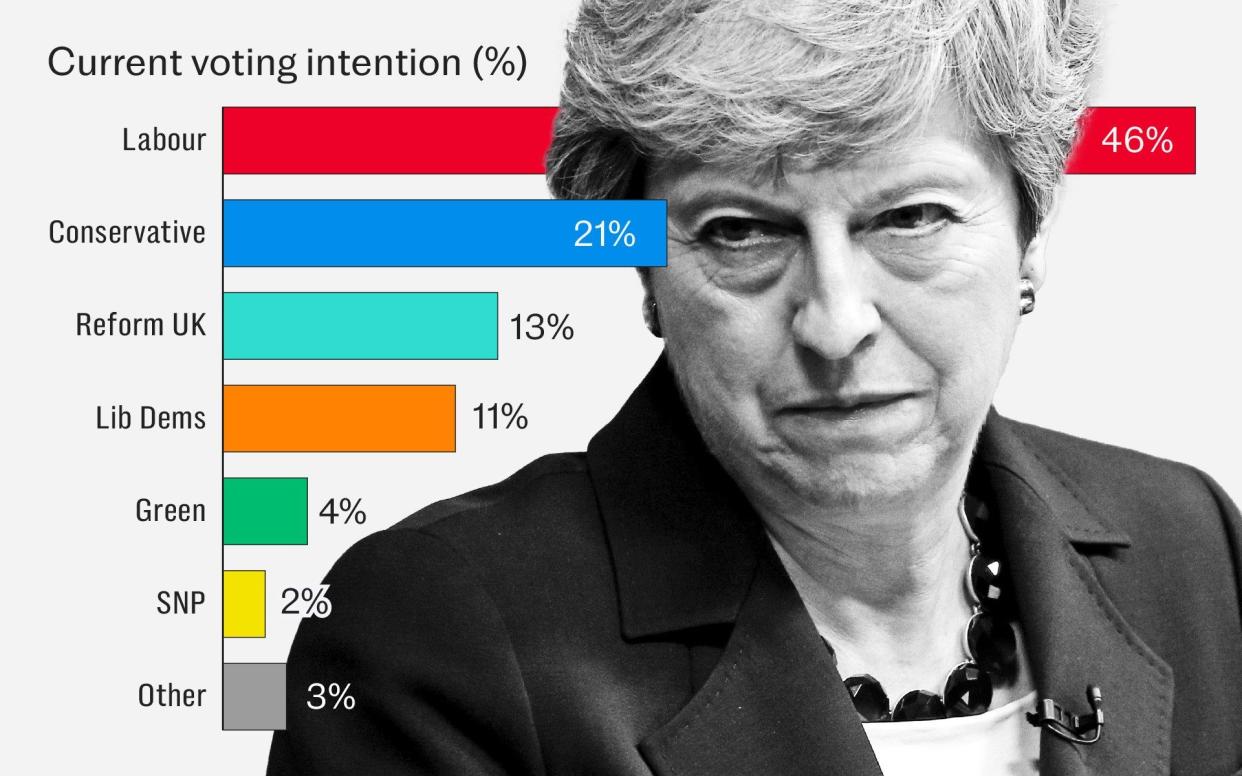Tories face ‘electoral extinction’ with support at lowest since Theresa May’s final days

The Conservatives have slumped to their lowest vote share since the final days of Theresa May’s premiership, fuelling warnings the party is approaching “electoral extinction”.
Polling by Savanta for The Telegraph puts the Tories on 21 per cent – the lowest share for the party recorded by the pollster since the weeks before Mrs May resigned in May 2019 as her government was paralysed over Brexit.
In contrast, Reform UK has risen to its highest-ever share in a Savanta poll, while Labour’s lead over the Tories has grown to its largest during Rishi Sunak’s tenure as prime minister.
The poll, conducted between June 12 and 14, put Labour up two points at 46 per cent and the Tories down four at 21 per cent, its lowest share in a Savanta (formerly Comres) poll in five years.
Reform surged by three points to 13 per cent with an increase of two points for the Liberal Democrats to 11 per cent.
Reform’s 13 per cent share is the highest in a Savanta poll since the party’s official creation in January 2021, and Labour’s 25-point lead is its largest since October 2022 when the Tories were reeling from Liz Truss’s disastrous mini-Budget.
The Green Party gained one point to reach 5 per cent and the SNP went down one to 2 per cent.
The results cap off another dire week for Mr Sunak in which an earlier poll showed Reform had overtaken the Tories for the first time.
Chris Hopkins, Savanta’s political research director, said: “Our research suggests that this election could be nothing short of electoral extinction for the Conservative Party. The hopes of Conservative candidates are being shot to pieces by poll after poll showing the Conservative Party in increasingly dire straits – and we’re only halfway through the campaign.
“There’s a real sense that things could still get worse for the Conservatives, and with postal votes about to drop through millions of letterboxes, time is already close to running out for Rishi Sunak.”
As well as testing voting intention, Savanta polled the 2,045 people on other questions, including which of the two main parties they thought would be most likely to raise a series of taxes, including capital gains tax, corporation tax and inheritance tax.
In a sign that Conservative attacks may finally be cutting through, Labour was seen as the most likely party to raise all of the taxes listed, with at least 50 per cent of UK adults saying that they are more likely than the Conservatives to raise corporation tax (55 per cent versus 28 per cent), inheritance tax (54 per cent vs 27 per cent), capital gains tax (53 per cent vs 30 per cent), income tax (51 per cent vs 36 per cent) and national insurance (50 per cent vs 32 per cent).
While Conservative and Reform voters were mostly of the opinion that Labour would increase all types of tax, around half of current Labour voters admit that their party is the most likely to raise corporation tax, capital gains tax and inheritance tax.
Polled on whether a series of key Tory manifesto policies would make them feel more positively or negatively towards the party, all the pledges had a net positive impact.
For example, a promise to abolish stamp duty for first-time buyers on homes worth up to £425,000 was five times more likely to make the public feel more positively (50 per cent) towards the Tories than more negatively (10 per cent).
However, in every case when asked whether they trusted the Tories to deliver on the policies, a majority of voters did not trust them to do so.
Mr Hopkins said: “Herein lies the fundamental problem for the Conservative Party’s election campaign. While it’s priced in that Labour will raise some taxes, and the Conservative manifesto has some well-liked ideas, the public no longer trusts the Conservatives to deliver on anything they say, including some reasonably popular manifesto policies.”
With the Tory manifesto declining to commit to withdrawing from the European Convention on Human Rights, six in ten (57 per cent) said that the UK should remain a member of the ECHR, compared to just over a quarter (28 per cent) that said the UK should leave.
Half (49 per cent) of people believed a claim from the Energy Secretary Claire Coutinho that removing fossil fuels from UK electricity by 2030 – something promised by Labour – could lead to blackouts, with 37 per cent saying the assessment was wrong.
After Mr Sunak asked veterans to “find it in their hearts” to forgive him for leaving D-Day commemorations early, 61 per cent said that veterans would not forgive him, with 22 per cent saying they would.
Those aged 65 and over were most likely of all age groups to say that veterans will forgive Mr Sunak (28 per cent vs 17-24 per cent in other age groups), although 58 per cent of those 65 and above still said that veterans would not forgive the Prime Minister.


 Yahoo News
Yahoo News 
